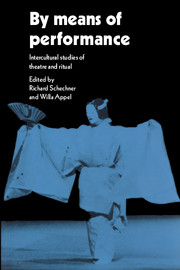Book contents
- Frontmatter
- Contents
- List of figures
- Notes on contributors
- Concerning Victor Turner
- Introduction
- 1 Are there universals of performance in myth, ritual, and drama?
- 2 Magnitudes of performance
- 3 Liminality: a synthesis of subjective and objective experience
- 4 The Yaqui deer dance at Pascua Pueblo, Arizona
- 5 A Yaqui point of view: on Yaqui ceremonies and anthropologists
- 6 Performance of precepts/precepts of performance: Hasidic celebrations of Purim in Brooklyn
- 7 The significance of performance for its audience: an analysis of three Sri Lankan rituals
- 8 What does it mean to “become the character”: power, presence, and transcendence in Asian in-body disciplines of practice
- 9 Korean shamans: role playing through trance possession
- 10 The practice of noh theatre
- 11 The profanation of the sacred in circus clown performances
- 12 Ethnographic notes on sacred and profane performance
- 13 The spatial sense of the sacred in Spanish America and the American South and its tie with performance
- 14 Space and context
- 15 The transformation of consciousness in ritual performances: some thoughts and questions
- 16 Universals of performance; or amortizing play
- Appendix
- Bibliography
- Index
Introduction
Published online by Cambridge University Press: 05 June 2012
- Frontmatter
- Contents
- List of figures
- Notes on contributors
- Concerning Victor Turner
- Introduction
- 1 Are there universals of performance in myth, ritual, and drama?
- 2 Magnitudes of performance
- 3 Liminality: a synthesis of subjective and objective experience
- 4 The Yaqui deer dance at Pascua Pueblo, Arizona
- 5 A Yaqui point of view: on Yaqui ceremonies and anthropologists
- 6 Performance of precepts/precepts of performance: Hasidic celebrations of Purim in Brooklyn
- 7 The significance of performance for its audience: an analysis of three Sri Lankan rituals
- 8 What does it mean to “become the character”: power, presence, and transcendence in Asian in-body disciplines of practice
- 9 Korean shamans: role playing through trance possession
- 10 The practice of noh theatre
- 11 The profanation of the sacred in circus clown performances
- 12 Ethnographic notes on sacred and profane performance
- 13 The spatial sense of the sacred in Spanish America and the American South and its tie with performance
- 14 Space and context
- 15 The transformation of consciousness in ritual performances: some thoughts and questions
- 16 Universals of performance; or amortizing play
- Appendix
- Bibliography
- Index
Summary
So began a short statement written by Victor Turner in December 1980 addressed to the planning committee for the upcoming series of conferences on ritual and theatre held in 1981 and 1982 in Arizona and New York. These conferences – one on the Yaqui deer dance, one on Japanese performance, and one on the interrelation of a number of genres viewed from a global perspective – were sponsored by the Wenner–Gren Foundation for Anthropological Research and supported by a consortium of organizations.
By Means of Performance is a further step in the process of exploring some of the interweavings of ritual and theatre, a process Victor Turner and Richard Schechner had been exploring for some time. In 1980, Turner articulated very clearly what he saw as the goal of the 1981 and 1982 conferences
Cultures are most fully expressed in and made conscious of themselves in their ritual and theatrical performances. […] A performance is a dialectic of “flow,” that is, spontaneous movement in which action and awareness are one, and “reflexivity,” in which the central meanings, values and goals of a culture are seen “in action,” as they shape and explain behavior. A performance is declarative of our shared humanity, yet it utters the uniqueness of particular cultures. We will know one another better by entering one another's performances and learning their grammars and vocabularies.
- Type
- Chapter
- Information
- By Means of PerformanceIntercultural Studies of Theatre and Ritual, pp. 1 - 7Publisher: Cambridge University PressPrint publication year: 1990
- 4
- Cited by



